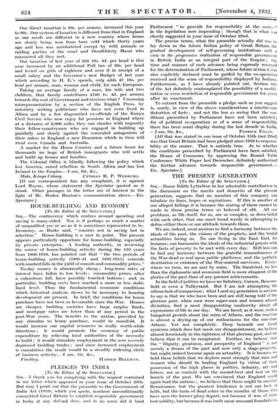HOUSE-BUILDING AND ECONOMY
[To the Editor of the SPECTATOR.] Sia,The controversy which centres around spending and saving is many-sided. Nor is it perhaps so much a matter of unqualified yes or no as it is sometimes represented to be. Economy, as Burke said, "consists not in saving but in selection." House-building is a case in point. The present appears particularly opportune for house-building, especially by private enterprise. A leading authority, in reviewing the course of house-building activity during the 110 years from 1800-1910, has pointed out that "the two periods of house-building activity (1801-41 and 1891-1911) coincide with marked falls in the yield of consols and commodity prices."
To-day money is abnormally cheap ; long-term rates of interest have fallen to low levels ; commodity prices, after a calamitous fall, have possibly touched bottom ; and, in particular, building coats have reached a more or less stabi- lized level. Thus the fundamental economic conditions which historical analysis shows to be necessary to housing development are present. In brief, the conditions for house purchase have not been so favourable since the War. Houses are cheaper, building societies have large surplus funds, and mortgage rates are lower than at any period in the post-War years. The benefits to the nation, provided by any stimulus to house purchase, would be manifold. It would increase our capital resources in really worth-while directions ; it would promote the economy of public expenditure by relieving local authorities of the necessity to build ; it would stimulate employment in the now severely depressed building trades ; and since increased employment is cumulative the result would be a steadily widening circle of business activity.—I am, Sir, &c.,










































 Previous page
Previous page